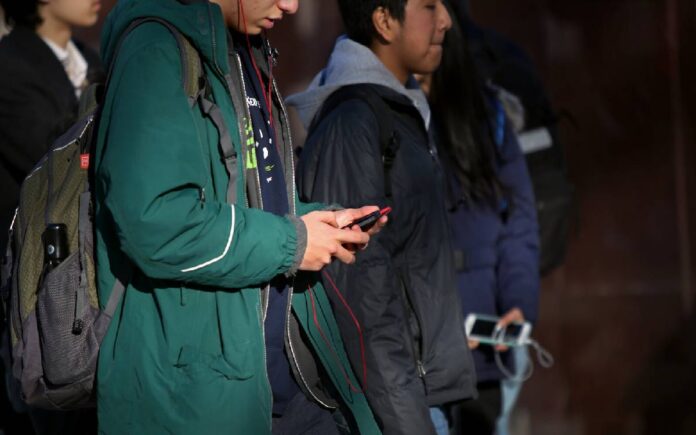NewYork: In a sweeping new initiative, New York has announced a statewide ban on smartphones in public schools during instructional hours, positioning itself at the forefront of a growing national movement to curb student screen time and its associated impacts. Governor Kathy Hochul confirmed the policy this week, noting that the directive is aimed at protecting students from the addictive pull of social media and returning classroom focus to learning.
The ban, which will apply to all students from kindergarten through 12th grade, mandates that schools across New York — including New York City — develop and implement “bell-to-bell” plans for the storage of smartphones and other internet-enabled personal devices such as smartwatches. The policy will prohibit unsanctioned device use not only during classes but also at lunch and other non-instructional times throughout the school day. However, basic mobile phones without internet capabilities are exempt from the restriction.
New York becomes the latest in a group of more than a dozen states — including California, Florida, Virginia, and Louisiana — that have adopted legislation requiring districts to limit student phone use, though the extent and enforcement of those policies vary widely.
Tackling the Toll of Tech on Youth
The push for school-based phone bans comes amid growing concern over the effects of constant digital connectivity on the mental health of young people. Research shows that approximately 90% of U.S. teenagers now own smartphones, and nearly one-third of 8-year-olds have their own device. This trend has coincided with alarming increases in adolescent depression, anxiety, and self-harm — trends that public health officials, including the U.S. Surgeon General, have partially linked to social media overexposure.
Governor Hochul stated that her support for the ban was galvanized by first-hand accounts from students themselves, many of whom described the mental and emotional toll of constant digital engagement. “Now, we’re protecting them from addictive technology designed to hijack their attention,” Hochul said. “Cellphones have dragged too many of our kids into dark places.”
Broad Support for the Ban
The smartphone restriction enjoys wide bipartisan and public support. A recent Siena College poll found that over 60% of voters — including majorities across political affiliations — favor a statewide school phone ban. The initiative also has backing from major education stakeholders, including nonprofit advocacy organizations and both the New York State United Teachers and the United Federation of Teachers.
To support the transition, New York will provide up to $13 million in funding to help school districts purchase secure storage solutions for devices. Schools must have implementation plans in place by the start of the upcoming academic year. The measure was introduced as part of the state’s $254 billion preliminary budget agreement.
Implementation and Flexibility
Hochul emphasized that schools must allow for “common-sense exemptions” under the policy. This includes accommodating students who rely on devices for medical reasons or translation services. Additionally, districts must offer ways for parents to reach their children in emergencies — a key concern voiced by families following past school safety incidents.
While many schools in New York already employ their own forms of device control — from classroom cubbies in middle schools to locking pouches in high schools — this is the first time a unified, statewide mandate will be enforced. The state will also require schools to monitor and report on the rollout, with a focus on identifying and addressing any disparities in enforcement.
A National Trend With Mixed Results
The trend toward limiting school phone use is spreading nationwide, reflecting shared concerns about attention spans, cyberbullying, and the disruption of classroom environments. Teachers report that students often record TikTok videos during breaks, browse Instagram in restrooms, and text throughout lessons. Digital distractions have become a challenge not only for focus but also for maintaining healthy peer interactions.
Yet critics remain cautious. Some civil rights organizations, such as the New York Civil Liberties Union, have warned that the ban could increase the risk of invasive searches or surveillance of students. Others argue that boosting access to counseling and student wellness resources would be a more constructive response to the youth mental health crisis.
Concerns have also been raised about the potential impact on students who use phones for after-school responsibilities, such as work or caring for siblings. Some educators and parents argue that school leaders should retain local authority to tailor phone policies to their specific communities.
Not Just Phones: Broader Tech Questions Loom
The smartphone debate is also part of a wider conversation about technology in education. While phones draw the most attention, studies have shown that excessive computer and tablet use — especially for non-instructional purposes — can also hinder learning. Despite this, devices like Chromebooks have become standard tools even in early grade classrooms, prompting educators to reflect on when and how screens best support education.
Governor Hochul’s initiative may not be the final answer, but it marks a significant shift in how schools are approaching the digital habits of today’s youth — and a growing recognition that less screen time might be the first step toward more meaningful learning.



